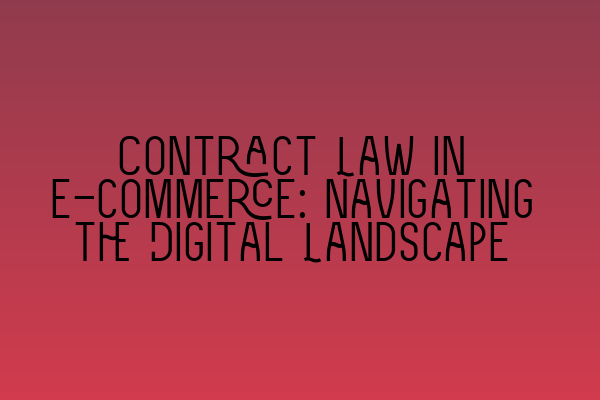Contract Law in E-commerce: Navigating the Digital Landscape
In today’s digital age, e-commerce has become an integral part of our daily lives. From online shopping to digital services, businesses are adapting to the shift towards a digital landscape. However, with this growth comes the need for a solid understanding of contract law in the e-commerce sector.
As a solicitor specializing in contract law at SQE Contract Law, I have seen firsthand the complexities that arise in e-commerce transactions. In this blog post, I will guide you through the key aspects of contract law in the digital world and provide insights on how to navigate this intricate landscape.
1. The Importance of Contracts in E-commerce
Contracts are the foundation of any business transaction, and this holds true in the e-commerce realm. They establish the rights and obligations of the parties involved, ensuring clarity and a mutual understanding of the terms of the agreement. Whether you are a seller, a buyer, or a service provider, having a meticulously drafted contract is essential for protecting your interests.
2. Essential Elements of an E-commerce Contract
To have a legally binding contract in the e-commerce sector, certain elements must be present. These include:
a. Offer and Acceptance: An offer is made by one party, and the other party accepts it, forming an agreement. In the digital world, these offers and acceptances are often made through website terms and conditions or electronic acceptance buttons.
b. Consideration: Consideration refers to something of value exchanged between the parties, such as money, goods, or services. In e-commerce, this consideration is usually monetary.
c. Intention to Create Legal Relations: Both parties must have the intention to create a legally binding relationship. In e-commerce, this intention is assumed unless otherwise stated.
d. Capacity: Each party must have the legal capacity to enter into a contract. Minors, individuals lacking mental capacity, or those under the influence of drugs or alcohol may lack the capacity to enter into a valid contract.
3. Common Issues in E-commerce Contracts
While e-commerce offers numerous benefits, there are also common issues that arise in contract law within this domain. Some of these issues include:
a. Online Misrepresentation: Misleading descriptions of products or services can lead to disputes between buyers and sellers. It is important for businesses to ensure accurate representations to avoid potential legal repercussions.
b. Defective or Non-Conforming Goods: The sale of defective or non-conforming goods can lead to disputes and breaches of contract. Businesses should have clear policies and procedures in place to handle such situations effectively.
c. Payment Disputes: E-commerce transactions involve various payment methods, such as credit cards, online transfers, and digital wallets. Disputes may arise regarding payment processing, fraud, or unauthorized charges. Having robust mechanisms to address these issues is crucial.
d. Privacy and Data Protection: E-commerce transactions often involve the collection and processing of personal data. Compliance with data protection laws and ensuring the security of customer information are vital for businesses to avoid legal complications.
4. Tools to Mitigate Risks
To navigate the digital landscape of e-commerce successfully, businesses should employ certain tools to mitigate risks and ensure legal compliance. Some essential tools include:
a. Well-drafted Terms and Conditions: Having comprehensive and tailored terms and conditions on your website can help set clear expectations and protect your business interests.
b. Privacy Policies and Data Protection Measures: Implementing robust privacy policies and data protection measures can enhance customer trust and ensure compliance with applicable data protection laws.
c. Dispute Resolution Mechanisms: Consider including clauses in your contracts that specify how disputes will be resolved, such as through arbitration or mediation. This can save time, money, and potential damage to your business reputation.
d. Continuous Legal Review: As the e-commerce landscape evolves, it is crucial to stay updated with the latest legal developments and review and revise your contracts accordingly.
If you are interested in furthering your understanding of contract law, SQE Contract Law provides comprehensive SQE 1 and SQE 2 preparation courses. These courses will equip you with the necessary knowledge and skills to navigate the complexities of contract law, preparing you for success in the legal profession. Additionally, you can test your knowledge with our SQE 1 Practice Exam Questions or explore our SQE 1 Practice Mocks FLK1 FLK2.
In conclusion, having a solid grasp of contract law is essential for businesses operating in the e-commerce space. By understanding the importance of contracts, familiarizing yourself with the essential elements, addressing common issues, and employing tools to mitigate risks, you can navigate the digital landscape with confidence. Stay informed, stay compliant, and ensure your e-commerce transactions are built on a solid contractual foundation.
Please note that the information provided in this blog post is for general guidance only and does not constitute legal advice. For specific legal advice tailored to your situation, it is advised to consult with a qualified solicitor.
